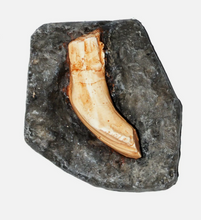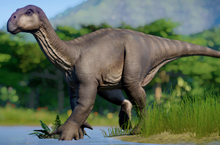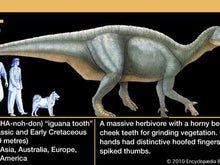Iguanodon Tooth #2 – Museum-Quality Replica
Description:
This is a museum-quality replica of a lower tooth from Iguanodon bernissartensis, one of the first dinosaurs ever discovered. The original fossil, dating back to the Early Cretaceous, was found in the Wealden Beds of Sussex, UK, and collected by Gideon Mantell in the 1820s.
This high-quality cast is made directly from the actual fossil and even replicates its texture and detail—including natural wear on the crown and part of the root. It’s an exact reproduction, ideal for educational displays, fossil collections, or dinosaur enthusiasts.
Features:
Cast directly from the original fossil
Displays the crown with natural wear and partial root
Made of durable, lifelike resin
Measures: Tooth – 40mm x 22mm, Matrix – 50mm x 33mm
Color may vary slightly
---
About Iguanodon:
The name Iguanodon means “Iguana tooth,” a nod to its herbivorous diet and the shape of its teeth—flattened side to side and leaf-like, perfect for slicing vegetation.
Classification: Ornithopoda → Iguanodontia → Iguanodontidae
Known for: Thumb spike (possibly for defense), four-fingered hand
Diet: Ferns, horsetails (like modern Equisetum), cycads, and conifers
Habitat: Swampy, river-edge environments
Behavior: Likely moved in herds, as evidenced by fossil trackways and group skeleton finds
---
Availability:
🛒 Order Now at:
🌐 TaylorMadeFossils.com
🌐 BigfootCasts.com
📧 Email: fossils@yahoo.com
📞 Phone: 314-556-0650
.......
Iguanodon tooth #2
Iguanodon is the first dinosaur ever discovered. Best cast replica tooth comes from an Iguanodon.
Museum quality reproduction of an Iguanodon bernissartensis lower tooth. The original fossil came from the Cretaceous Period. Wealden Beds of Sussex,
The replica tooth measures 40mm x 22mm on a matrix of 50mm x 33mm.
Color may vary.
Iguanodon orientalis
Iguanodon means "Iguana tooth". It is classified as: Ornithopoda; Iguanodontia; Iguanodontidae
Early Cretaceous
Its hands had four fingers and a spike-like thumb, which it may have used to defend itself. Its teeth are reminiscent of those in hypsilophodonts, flattened side to side, and leaf-shaped. They probably sliced up plant material like a pair of scissors.
Because of the large number of skeletons of these dinosaurs frequently found together and evidence from fossil track ways, palaeontologists think they may have formed herds. Their remains are most often found in sediments deposited in swampy, lake and river edge environments suggesting that is the place they spent most of their time munching on horsetails (like the living Equisetum), ferns, cycads and various kinds of conifers.
Order Now:
Available at: TaylorMadeFossils.com and BigfootCasts.com
📧 Email: fossils@yahoo.com
📞 Phone: 314-556-0650





